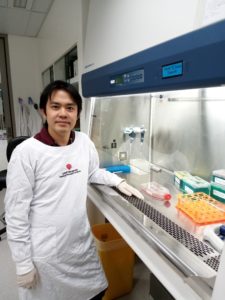Dr Kyohei Nakamura: Using immunotherapy to improve lymphoma outcomes

Lymphomas represent over 44% of all blood cancer diagnosis in Australia.
Nearly 7,000 Australians are diagnosed with lymphoma annually and, by 2035 this number will jump by a further 147% making for an extra 10,000 cases every year.
Cancer immunologist Dr Kyhoei Nakamura, who leads the Immune Targeting in Blood Cancers lab at QIMR Berghofer Medical Research Institute, is determined to change the face of lymphoma in Australia.
Immunotherapies are revolutionising the way that blood cancers are treated. Clinical outcomes of lymphoma patients have been improved by an antibody-based immunotherapy called rituximab. Treatments like rituximab bind to proteins on the surface of blood cancer cells and help the individual’s own immune cells to recognise and eliminate them. For individuals who either don’t respond to rituximab or relapse, treatment can be very challenging. Dr Nakamura and his team have recently identified an immunosuppressive factor that may be responsible for the therapeutic resistance to rituximab and other immunotherapies. By characterising this factor, and the pathways associated, Kyohei aims to develop a new therapeutic approach against lymphoma and improve antibody-based immunotherapies.
About Kyhoei
Kyhoei is a cancer immunologist, leading the Immune Targeting in Blood Cancers Laboratory at QIMR Berghofer Medical Research Institute. He has received clinical training at Department of Haematology and Rheumatology, Tohoku University Hospital, Sendai, Japan. After earning his PhD in Medicine, Kyohei moved to QIMR Berghofer in 2015 to work on cancer immunology. His research focuses on understanding the interplay between immune cells and cancer cells to find a way to harness anti-tumour immunity in blood cancers.
This research project is kindly supported through the Estate of Madella Ann Hay.
Last updated on October 4th, 2022
Developed by the Leukaemia Foundation in consultation with people living with a blood cancer, Leukaemia Foundation support staff, haematology nursing staff and/or Australian clinical haematologists. This content is provided for information purposes only and we urge you to always seek advice from a registered health care professional for diagnosis, treatment and answers to your medical questions, including the suitability of a particular therapy, service, product or treatment in your circumstances. The Leukaemia Foundation shall not bear any liability for any person relying on the materials contained on this website.